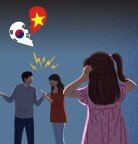Bush Meets With Chinese Rights Leaders
On May 11, U.S. President George W. Bush hosted Professor Wang Yi (33) from Chengdu University and two other religious freedom defenders at the White House. It was the first time a U.S. president met Chinese human rights activists. Their meeting invited strong protest from the Chinese government.
Author Yu Jie (33) and lawyer Li Baiguang were among the three who met President Bush. After the talks, Dong-A Ilbo exclusively interviewed the two activists about their conversation with the U.S. president.
According to Yu, he told President Bush, More and more young, well-educated Chinese choose to become Christians. We will change China in a non-violent, peaceful way just as Dr. Martin Luther King, Jr. did. President Bush warmly responded to the author by saying, I express my respect to Christians in China who even risk their own lives to defend their religious beliefs.
President Bush continued to ask, What would you want me, as president of the U.S., to do? The same question was put to Kang Cheol Hwan and Kim Hahn Mi, North Korean defectors, when they visited the White House.
The three Chinese activists stressed the need for human rights and religious freedom, the reinforcement of human rights diplomacy by U.S. diplomats in China, and an end to internal Internet censorship by Yahoo! China and Google China. President Bush appeared to agree with them on the first two demands. However, on the last one, he expressed his uneasiness, explaining, The government cannot interfere with decision-making in private businesses. Still, the president remained optimistic about the future, saying, The American public opinion might change how the shareholders of those Internet firms view the issue.
Yu described the overall atmosphere of the conversation by saying, The meeting took place not in the Oval Office, but at the presidential residence. We were like old friends. According to Yu, the three Chinese visitors and President Bush laughed after discovering a commonality among them: when it comes to their religious beliefs that their wives have played a key role.
The three religious activists presented their gifts; books they wrote that Chinese authorities have banned, documentary DVDs on Christianity in China, and Christian magazines published in Chinese. President Bush expressed his gratitude with tiepins and brooches.
The venue was changed to the presidential residence, a more personal place, the morning of the meeting. Though Secretary of State Condoleezza Rice and state department officials entrusted with U.S.-China diplomacy were scheduled to join the meeting, their participation was canceled. These are interpreted as the minimum efforts made in consideration of a strong complaint from the Chinese government.
Nonetheless, Vice President Dick Cheney, White House Chief of Staff Joshua Bolten, and National Security Adviser Stephen Hadley accompanied the president to the meeting.
Seung-Ryun Kim srkim@donga.com







